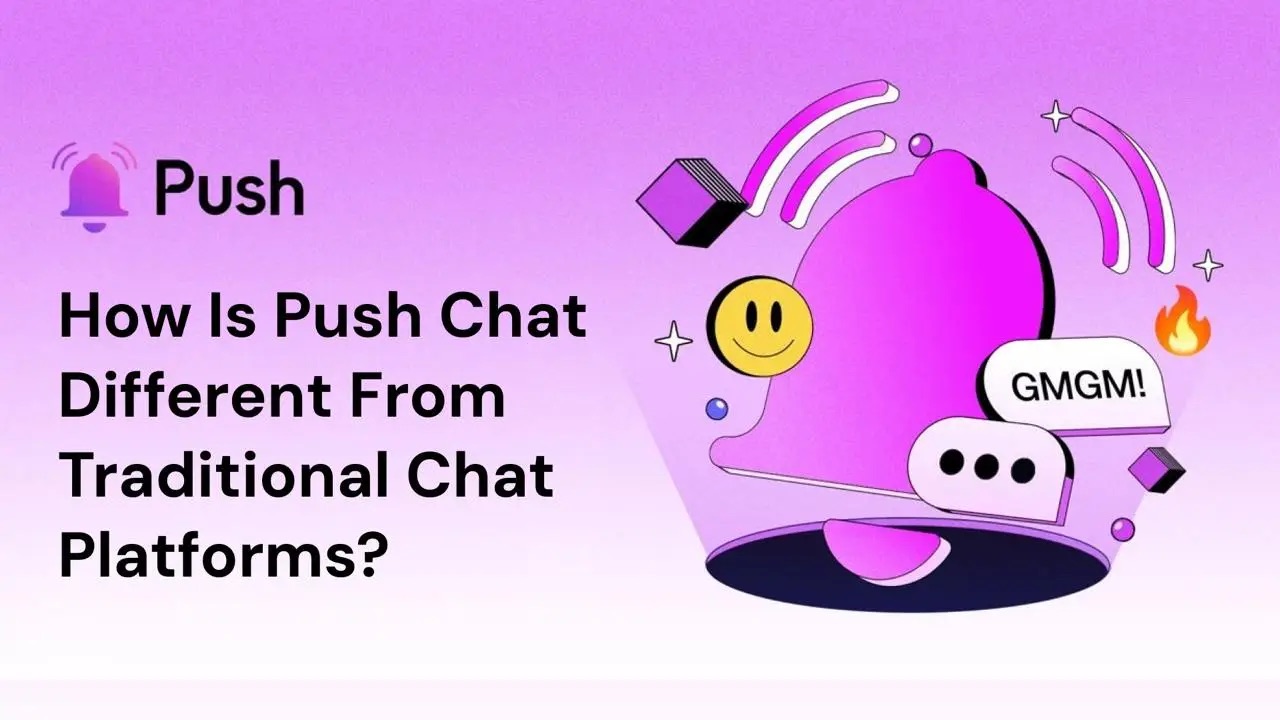How Push Chat is Revolutionizing Digital Communication in Web3
 Ayush Sahu
Ayush Sahu
As the digital world shifts toward greater decentralization, users’ expectations around privacy, control, and engagement in their favorite chat platforms are evolving. Enter Push Chat — Web3’s innovative communication protocol that reimagines digital messaging with cutting-edge technologies, improved user experience, and user-first functionalities that traditional platforms like WhatsApp, Telegram, and Signal simply lack.
In this blog post, we’ll dive deep into what sets Push Chat apart and how it’s shaping the next frontier of communication.

Privacy and Anonymity: No Phone Number or Email Required
One of the most striking differences between Push Chat and traditional chat apps is the way it handles user identity. Apps like WhatsApp and Telegram require a phone number or email for registration, tying users to a specific identity that can expose them to data tracking, phishing, and unwanted contacts.
Push Chat bypasses this entirely. Users only need a compatible EVM wallet to connect — meaning they can remain anonymous and communicate securely without compromising their identity. Since no personal information is stored on centralized servers, the risk of data leaks or misuse is eliminated. This approach aligns perfectly with the principles of decentralization, giving users complete control over their data.
Spam Prevention with Opt-In Chats
Spam and unwanted messages are common issues on traditional platforms. Push Chat offers a proactive solution: opt-in chats. Users must accept a request before any conversation begins, ensuring they only receive messages from approved contacts. This built-in spam filter creates a streamlined, distraction-free experience.
In contrast, traditional platforms often rely on manual blocking and reporting mechanisms, which can be cumbersome and reactive.
Advanced Encryption with Public Key Cryptography (PKC)
Push Chat prioritizes privacy through end-to-end encryption using public key cryptography (PKC). While some traditional platforms like WhatsApp offer encryption, Push Chat takes it a step further by leveraging decentralized public-private key pairs.
When a user registers with Push Chat via their wallet, a key pair is generated: the private key remains in their wallet, and the public key is used to encrypt messages. Only the intended recipient with the corresponding private key can decrypt and read the message, ensuring unparalleled message security.
This use of asymmetric cryptography makes it extremely difficult for third parties to intercept or decode messages, reinforcing privacy across the network.
Interactive Experiences with Farcaster Frames
Push Chat isn’t just about text and media. With Farcaster Frames integration, users can interact with embedded mini-web apps directly within their chat. This brings new dimensions of interactivity, allowing for:
On-Chain Interactions: Stake tokens, vote on governance proposals, or claim rewards without leaving the chat.
Gamification and Utilities: Engage with community games, NFT rarity checkers, or DAO-specific tools.
Integrated Product Use: Access DeFi tools, swap tokens, or explore digital collectibles seamlessly within Push Chat.
This level of interactivity surpasses the static nature of traditional messaging platforms, transforming chats into vibrant, dynamic environments.
Enhanced Security with Decentralized Infrastructure
Unlike centralized platforms that store data on vulnerable servers, Push Chat uses IPFS to store messages, making them accessible yet tamper-proof. Decentralized nodes within the Push Network validate all messages, ensuring sender authenticity and message integrity.
This decentralized architecture eliminates single points of failure and minimizes the risk of data breaches, giving users full control over their information.
Ecosystem Integration and Web3 Compatibility
Push Chat is designed for seamless Web3 integration, allowing it to be embedded directly within dApps across DeFi, DAOs, and NFT platforms through its SDK. Users can access messaging features without leaving their favorite Web3 applications, creating a unified interface for communication and interaction.
Hyperscalable Group Chats
Traditional chat apps often cap group sizes (WhatsApp limits them to 1024 members). Push Chat breaks these barriers, supporting group chats with up to 100,000 members. This scalability makes it ideal for DAOs, large Web3 communities, and global projects.
With Push Chat, Web3 communities can coordinate and communicate at scale without the limitations imposed by traditional platforms.
Future-Ready Payments (Coming Soon)
Push Chat is set to introduce secure, instant, and verifiable Web3 payments directly within chats. Unlike centralized payment systems like WeChat’s, Push Chat’s decentralized payment functionality will support seamless crypto transactions.
This feature opens up possibilities like:
DAO Contributions: Facilitate membership dues or community tipping.
Creator Support: Enable peer-to-peer payments for content creators.
Open-Source and Community-Driven
Push Chat’s open-source framework invites developers to integrate secure, on-chain communication into their dApps. Its modular design and decentralized infrastructure make it a foundational building block for Web3’s evolving tech stack.
This community-centric approach fosters continuous innovation, empowering a wide range of Web3 projects to enhance their communication capabilities.
Push Chat: The Next Evolution of Digital Messaging
Push Chat redefines communication by merging decentralization with innovative features tailored for privacy, scalability, and interactivity. By prioritizing anonymous access, robust security, and community-driven tools, it sets a new standard for digital messaging in Web3.
Ready to experience the future of communication? Connect with your favorite channels or launch your own on Push Chat today and be part of the revolution.
Subscribe to my newsletter
Read articles from Ayush Sahu directly inside your inbox. Subscribe to the newsletter, and don't miss out.
Written by
